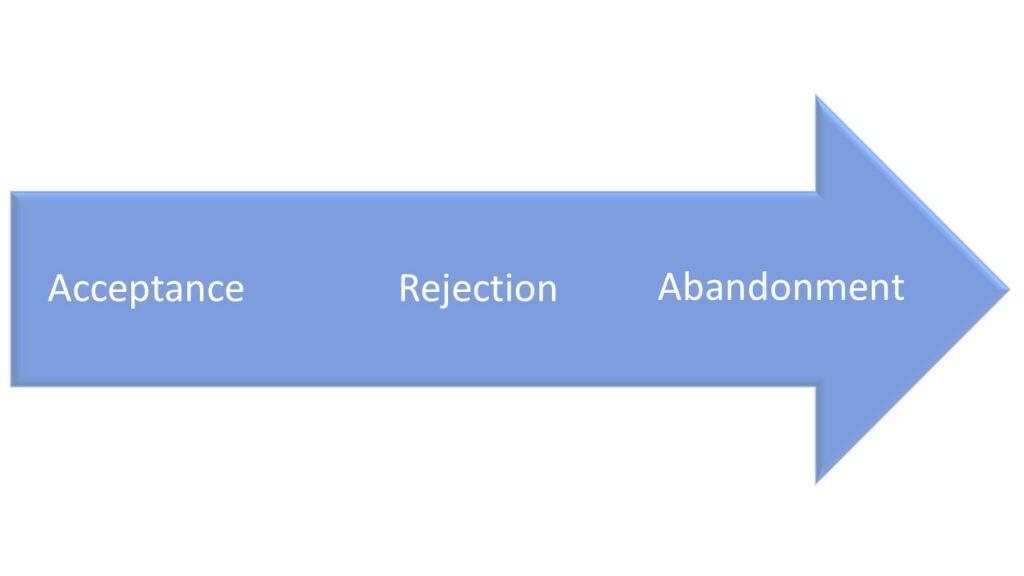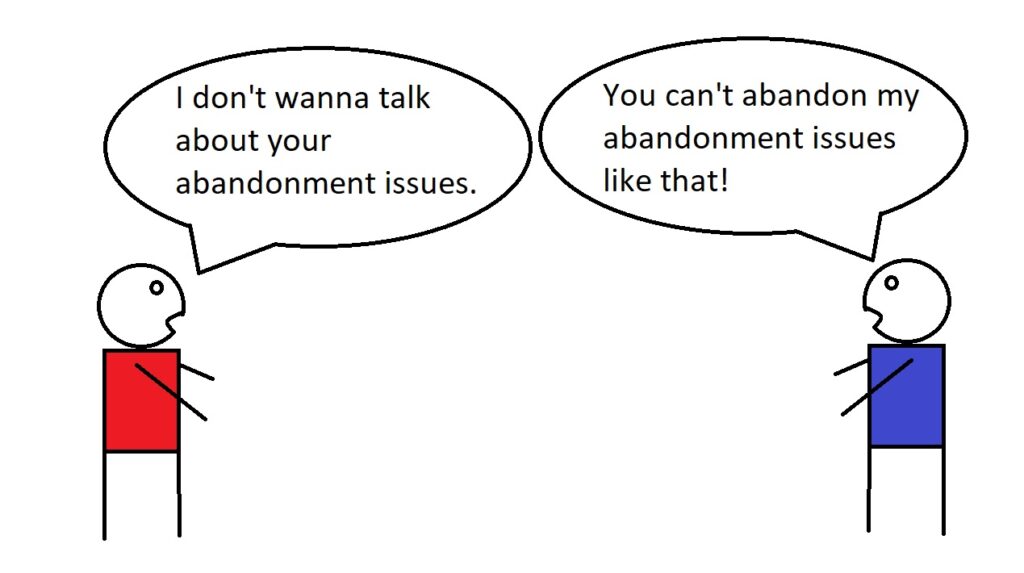People with abandonment issues fear being abandoned by their loved ones. Being the social species that we are, all of us dislike being abandoned by others, especially by our relatives and in-groups. While some level of this fear is normal, a person with abandonment issues lives in this fear constantly.
Accepting and rejecting someone lies on a spectrum. We accept someone on one end of the spectrum and reject or abandon them on the other.
It can be argued that rejection is better than abandonment because, at least in rejection, you don’t completely ignore the person. In rejection, you acknowledge them and then kick them out. In abandonment, you don’t even acknowledge them.

What causes abandonment issues?
Abandonment issues are mainly caused by parental emotional neglect in childhood. When parents don’t shower enough love, care, and attention on their children, the latter feel abandoned.
Also, abandonment issues result from parents not letting let their children develop their own identities.1
Children who’re loved develop a strong and healthy sense of self. They feel worthy and this gives them a better chance to thrive in life. Children who’re unloved fail to develop a strong sense of self. They feel unworthy and it prevents them from thriving in multiple areas of their lives.
The deep-seated feelings of abandonment get carried over into adulthood and have an especially detrimental effect on the person’s relationships.
Abandonment issues can also occur in adulthood if a person goes through a traumatic event involving the loss of a loved one such as a break-up, divorce, or a death.
Signs of abandonment issues in children
Separation anxiety is common in children. They usually cry when their parent leaves their company. In children with abandonment issues, this anxiety is exaggerated. Children with abandonment issues:
- Cling to their parents all the time
- Panic when their parent leaves
- Fear of being alone, even at bed time
- Get upset at the idea of their parent leaving in the future
Signs of abandonment issues in adulthood
Unresolved feelings of childhood abandonment can manifest in an adult’s behavior in a variety of ways. If a person shows more than half of the following signs, they likely have abandonment issues.
1. People pleasers
Those with abandonment issues seek to please people at all costs. They don’t want to do the slightest thing that has the chance of pissing people off.
2. Attention seekers
Their need to feel accepted forces them to present themselves to others as much as possible. They like showing off and having the spotlight of attention on them. If they notice that someone else in the room is getting more attention than them, they strive to get the attention back to themselves.
3. Over-investing in relationships
People with abandonment issues feel insecure in a relationship. So, they over-invest to ‘win over their partner over’ and reduce the chances of being abandoned. They shower their partner with compliments and gifts.
4. Trust issues
Feeling insecure makes it hard for them to trust others. They always have to be extra-sure before they can trust others or they think they’re risking being abandoned.
5. Pushing others away
A pre-emptive strike, they push people away before people get the chance to push them away.
“I’ll abandon you before you abandon me.”
6. Codependency
Since people with abandonment issues tend to have a weak sense of self, they mainly build their self through their relationships. They identify with their relationship partners and, in doing so, often overstep their boundaries, becoming emotionally dependent on them.
In short, they don’t have an identity and a life of their own.
7. Constant reassurance
Those with abandonment issues have to be constantly reassured that they won’t be abandoned. While some degree of such reassurance-seeking is normal in relationships, a constant need for reassurance points to abandonment issues.
8. Controlling behavior
Since they fear being abandoned, they do what they can to control the behavior of their partners so that their partners won’t leave them.
9. Shallow relationships
People with abandonment issues move from one shallow relationship to another because they fear intimacy. If they don’t get their emotions involved, they can’t be hurt and abandoned.
10. Sabotaging relationships
They act in irrational ways to get out of relationships. For example, they’ll make a big deal out of a petty issue so they can end the relationship and prove to themselves they’re unworthy of love.
11. Clinging to unhealthy relationships
If a relationship isn’t good for them, they’ll still cling to it because it’s better for them to be someone with someone than to be alone. They can’t stand being alone because then they’ll have to face who they really are, i.e., nothing.

Healing abandonment issues
The first step to healing abandonment issues is to recognize you have them. Begin by looking back at your relationships. How have they been? Are there patterns you’ve been repeating over and over?
It’s not always easy to link your present abandonment issues with your childhood, but you don’t need to. You can still cope with and overcome your abandonment issues.
Following are some of the most effective ways to heal abandonment issues:
1. Emotional expression
You may have been abandoned in childhood, but couldn’t fully process it because you were powerless and dependent on your parents.
The abandonment issues lingering inside you crave expression, no matter what mode of expression you choose. You may go to therapy and let it all out, talk to a friend, express yourself through art, and so on. Heck, you may even talk to your parents about it if they’re open.
Expressing emotions helps the mind to process them. This makes it easier for the mind to put these things behind and move on.
2. Healing internalized shame
As mentioned earlier, children who’re not loved feel unworthy. They develop what’s called internalized shame. While feeling shameful is normal in certain situations, internalized shame becomes a person’s state of being.2
This shame plus feelings of inadequacy envelop the core identity of a person, preventing them from experiencing life fully and exploring their potential.
The way to heal this internalized shame is to work on developing a strong sense of self. Cliché as it may sound, internalized shame can only be overcome by ‘finding yourself’ or becoming your own person.
You then need to keep feeding this new you until it completely envelops the core of who you are.
3. Overcoming irrational fears
Realize that your fear of losing your loved ones is exaggerated and irrational. Merely understanding how the dynamics of abandonment play out in your relationships should be enough to help you stop in your tracks and self-reflect.
Practice catching yourself when this irrational fear of losing others has you under its grip. With time, it’ll get easier and you’ll make better decisions.
4. See the good side of your relationships
Your fear of abandonment forces you to see only the unpleasant side of your relationships so it can justify itself. You have to constantly re-adjust by focusing on the good side of your relationships. This will help you view your relationships more realistically, unclouded by fear.
5. Flip the script
We all run these relationship scripts in our heads that were shaped by our childhood experiences.
“I’ll never marry someone like my mom.”
“I want to be with a guy who’s like my father.”
Our relationships with our parents and siblings create these models of love and affection for us that we look for or avoid in others.
“What does this have to do with abandonment?”, you ask.
Well, if you have the ‘I want him to be like my father’ script and you find he isn’t anything like your father, fear of abandonment can ensue. You’ll be like:
“He does love me but he isn’t like my father.”
This will create cognitive dissonance in your mind and you may resolve it by concluding your partner will soon abandon you. You want to sort of ‘maintain your script’ at the cost of losing a healthy relationship.
When you become aware of these scripts, they can cease to have power over you.
6. Ditching borrowed fears
In Psychology, there’s this concept called introjection which means adopting the mental states and traits of those close to you.3
For example, if your mother had abandonment issues because her father was never there for her, you may have ‘caught’ these issues from her.
The more you identify with a parent, the more aspects of their personality will you introject. The solution to this- and I risk sounding like a broken record here- is to work on developing your own identity.
Children go through this individuation stage during their development. They either come out of it becoming a new person or they remain copycats of their parents. Being a copy of your parent isn’t necessarily a bad thing, but be prepared to carry their personality baggage.
7. Seek social inclusion
Once you’ve developed an identity for yourself, seek people like you so you can feel accepted. If your identity deviates drastically from your social group, you’ll feel alien and abandoned.
8. Accept yourself
Look! the king of cliches is here- accept yourself. What does it even mean?
Internalized shame makes us turn away from ourselves in a way. We hide from the shame and cannot accept who we are. Once you replace that shame with an identity you like, you can start accepting the new you.
Once this happens, the world around you re-adjusts. You no longer attract unhealthy relationships. You expect people to treat you the same way you treat yourself. Your relationship with yourself becomes the model for your relationship with others, overriding whatever previous models your past may have saddled you with.
Take the brief abandonment issues quiz to test the level of your abandonment fears.
References
- Black, C. (2009). Changing course: Healing from loss, abandonment, and fear. Simon and Schuster.
- Claesson, K., & Sohlberg, S. (2002). Internalized shame and early interactions characterized by indifference, abandonment and rejection: Replicated findings. Clinical Psychology & Psychotherapy: An International Journal of Theory & Practice, 9(4), 277-284.
- Gobes, L. (1985). Abandonment and engulfment issues in relationship therapy. Transactional Analysis Journal, 15(3), 216-219.

